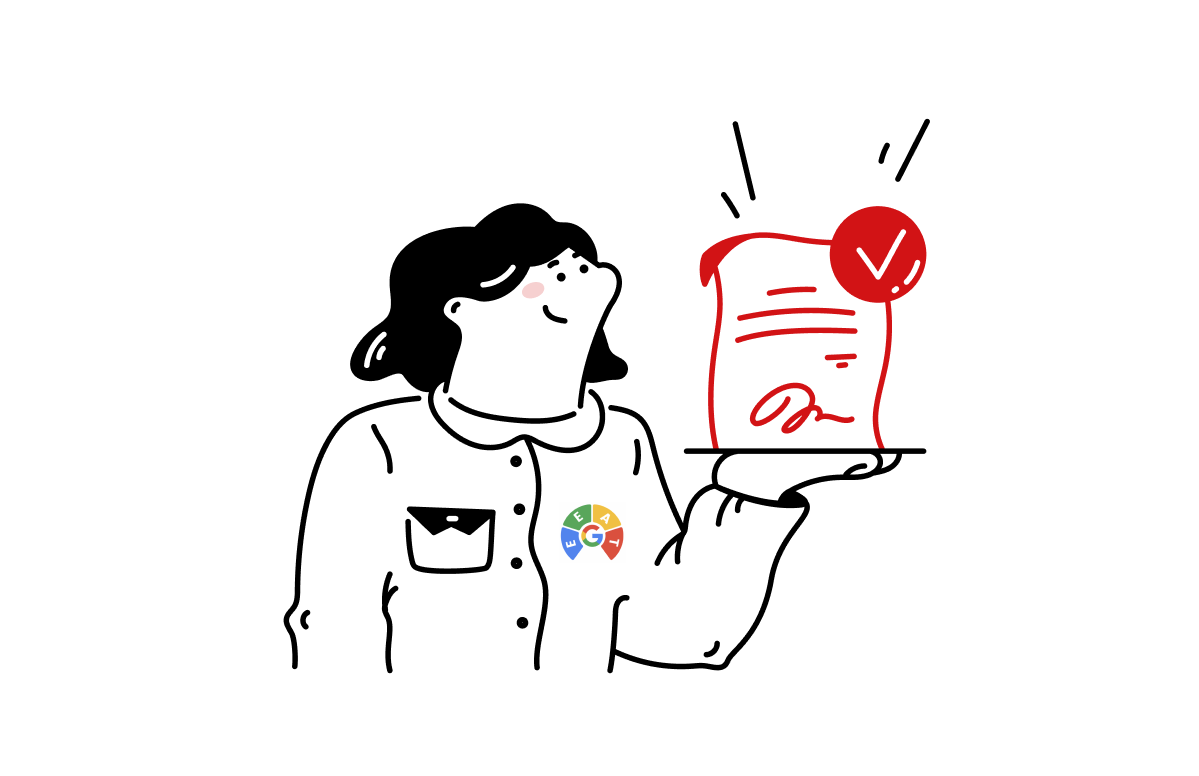Google E-E-A-T is your secret weapon for SEO rankings

In the jungle of online content, it is no longer enough to simply type some text and hope that Google will pick you up. No, these days Google really wants to know who you are, what you know, and especially whether you are trustworthy. That’s why E-E-A-T is such a gamechanger. It helps you not only to be found, but also to be taken seriously.
As a digital agency in the heart of Amsterdam, we have found that content that truly connects to the author’s experience and knowledge ranks much better. It’s as if Google is saying, “Don’t just tell me what you know, show me that you’ve actually done it.” And honestly? I couldn’t agree more. Because who doesn’t want content that is not only informative, but also reads well and inspires trust?
Why is E-E-A-T so important for SEO?
E-E-A-T is not just a buzzword in the SEO world. It is an important concept that has fundamentally changed the way Google rates Web sites. Where keywords and backlinks used to be looked at primarily, Google now looks much more at the quality and reliability of content. This means that your Web site must meet high standards of experience, expertise, authority and reliability.
By focusing on E-E-A-T, you ensure that your website meets the expectations of Google as well as your visitors. This leads to higher rankings in search results, more organic traffic and a better user experience. Moreover, it helps you stand out from competitors who only offer superficial content.
How Google rates E-E-A-T
Google uses a combination of sophisticated algorithms and human reviewers, called Search Quality Raters, to determine how well a website ranks on E-E-A-T.

These outside contributors rate Web sites based on the Quality Raters Guidelines and provide feedback that Google uses to improve its algorithms. While these ratings do not directly affect rankings, they are crucial for training the systems that determine which content best matches users’ search intent.
The reviewers look at the author’s experience, the depth of the content, the website’s reputation, and the reliability of the information, among other things. They also pay attention to things like transparency, contact information, and independent reviews. All of these together determine how well a Web site is rated on E-E-A-T.
The four pillars of E-E-A-T
Experience (Experience)
This is the new star in the E-E-A-T firmament. Google wants to know if you know the subject firsthand. You can compare it to the difference between someone saying they can ride a bike and someone actually tearing through the Amsterdam canals on their bike. That experience makes all the difference.
Want to really score? Share personal stories, original photos, or case studies you’ve conducted yourself. This not only makes your content more credible, but also a lot more fun to read.
Experience is important not only for demonstrating authenticity, but also for aligning your content with what users really want to know. This is because Google assumes that content based on adequate experience is better aligned with search intent and therefore more relevant to the user.
Expertise (Expertise)
Here it’s all about the knowledge you have. Do you have degrees, certificates, or years of experience? That counts. But even if you’re not a doctor or lawyer, you can show expertise by writing in-depth and well-researched content. Author expertise is crucial to the quality of information, especially in YMYL topics.
My tip? Show that you are an expert by clearly explaining your knowledge and backing it up with reliable sources. This is how you convince both Google and your readers.
Expertise is not just about formal qualifications, but about demonstrable expertise that is evident from the way you write content and its depth. This contributes to page quality and helps position your website as a trusted resource.
Authoritativeness (Authority)
Authority is built through recognition from others. Think backlinks from reputable websites, mentions in trade media, or an active role in your industry. It’s a bit like at a party: if everyone knows and respects you, you are the authority. In addition, publish articles and create clusters around relevant topics to demonstrate your authority within a particular topic.
For local businesses, involvement in the community is also a strong authority factor. And yes, social media profiles also play a role here – make sure you are active and consistent there. Network and share your expertise on external platforms to validate your brand.
In addition, link building is an important part of strengthening authority. By obtaining quality backlinks from external sources, you confirm your position as an authoritative player within a particular topic. This helps to achieve higher rankings in search results.
Trustworthiness.
This is the cornerstone of everything. No success without trust. Make sure your website is transparent about who you are, with clear contact information, an SSL certificate (that lock in your browser), and current, accurate content. In addition, provide an “about us” page with information about your company and team members to further build trust.
For YMYL (Your Money or Your Life) sites, this is extra important. Here a mistake can have serious consequences, so Google is strict. Be honest about sponsorships, affiliate links and make sure your privacy policy is up to date.
You also build trust by displaying independent reviews and positive reviews. This shows that others consider you a reliable source. In addition, regularly updating content helps prevent your visitors from getting outdated information.
Why we think E-E-A-T is so important (and you should too)
As a digital agency, we see E-E-A-T not as a boring checklist, but as an opportunity to really make a difference. It forces you to think about what you write, who you write it for, and how you do it in an authentic way. That sets you apart from the crowd.
Moreover, it ensures that your content is not only technically correct, but also adds real value. And that’s what it’s all about. Because let’s face it: the best SEO is content that helps, inspires and engages people.
By investing in E-E-A-T, you not only improve the quality of your content, but also the organic traffic to your website. Google uses these guidelines to provide users with the most relevant and reliable search results. Those who capitalize on this build a lasting online reputation.
Use this E-E-A-T checklist
To apply E-E-A-T effectively, it is important to focus not only on the content of your articles, but also on presentation and context. Here are a few valuable tips:
- Author pages: Make sure each author has their own page with a short biography, relevant experience and links to social media channels. This makes it clear to Google and visitors who is behind the content and why it is trustworthy. It is crucial here to clearly communicate the author’s necessary expertise and experience, especially for topics that fall under the YMYL category, such as health and finance.
- Originality and authenticity: Share personal experiences, case studies and original images or videos. This enhances your experience and makes your content more unique and credible. Google especially values content based on first-hand experience because it helps make search results complete and relevant to the user. Using original media also supports the trust and transparency of your website.
- Reliable sources: Refer to high-quality external sources to back up your expertise and authority. This shows that your content is well researched and based on facts. It is advisable to provide links to other authorities within your niche and reliable external sources so that Google and users see that your content is solidly based.
- Transparency: Be open about who you are, what you do, and how you operate. A clear “about us” page and contact information increase visitors’ trust. Transparency contributes to trust (confidence) and is an important factor within E-E-A-T. Also provide clear information about any collaborations, sponsorships and privacy policies.
- Reviews and testimonials: Collect and display positive reviews from customers or users. This strengthens your reputation and shows that others see you as trustworthy. Independent reviews are a powerful signal of trust and can make all the difference in convincing new visitors.
- Current content: Keep your content up-to-date and update it when there are new developments. This is especially important in YMYL topics, where outdated information can be harmful. Regularly updating your articles shows that you are actively engaged in providing accurate and reliable content, which increases quality and reliability.
- Good content and generated content: Focus on creating good content that meets the needs of your target audience. Avoid overusing automatically generated content without human control, as this can undermine quality and reliability. Google appreciates helpful content that actually helps users further and fully answers their questions.
- Optimize the technical side of your website: A well-functioning, fast and secure website contributes to the user experience and visitor confidence. Provide an SSL certificate, clear navigation and a mobile-friendly design. These are important factors that indirectly contribute to a higher E-E-A-T score.
By applying these tips, you will build a solid foundation for a high E-E-A-T score and improve your chances of ranking high in Google.
So.
- Be transparent about who the author is. A good author page with photo, bio and links to social media instantly gives you more credibility.
- Share personal experiences and original content. Show that you have really experienced the topic.
- Use reliable sources and list them neatly. This is how you build authority and trust.
- Make sure your website is secure and working properly. No one likes a site that falters or feels unsafe.
- Collect and display positive reviews and testimonials. Nothing works better than social affirmation.
- Actively build your online reputation beyond your own website. Consider guest blogs, interviews and participation in trade groups.
- Keep your content current and relevant. Google assumes that recent and up-to-date information is more reliable.
- Use original images, videos and case studies to highlight your experience. This can significantly improve the E-E-A-T rating.
- Presenting the author with a brief biography can increase credibility.
- Make sure your content matches your target audience’s search intent and that you cover relevant topics within your niche.
What you really really really really really need to know about Google E-E-A-T
- E-E-A-T stands for Experience, Expertise, Authoritativeness and Trustworthiness – the four magic ingredients for SEO success
- Google today primarily values content written by people who really know what they are talking about and have actually experienced it
- Especially with sensitive topics such as health and finance, E-E-A-T is not just a nice extra, but a must-have
- Although E-E-A-T is not a direct ranking factor, it plays a large role in how Google determines what content you as a user will see
- E-E-A-T is one of the main rating criteria Google uses to evaluate the quality of content and websites
- Focus on real expertise, transparency and content that actually helps your visitors, then you’re set
To further understand the importance of E-E-A-T, it’s good to know that Google is getting smarter at recognizing superficial content versus in-depth, valuable content. This means that it is no longer enough to simply use keywords or share general information. Google wants to see that the author of the article has adequate expertise and that the content meets the needs of the target audience.
In addition, the context of the page or Web site plays a big role. Google not only evaluates the article itself, but also looks at the reputation of the website and the credibility of the author. This means that an article written by an expert with demonstrable experience on a trustworthy website gets much more value.
In practice, this means ensuring transparency about who the author is, including a clear author page with social media profiles and other references to expertise. It’s also important to create content that is not only factually accurate, but can also convince other experts and contribute to the field. This is because Google does use E-E-A-T to determine how trustworthy and valuable a page or website is.
Moreover, it is crucial to realize that E-E-A-T is especially important in important matters such as health, finance and legal issues. After all, this is where misinformation can have major consequences. This is why Google has stricter requirements for these types of YMYL websites and looks extra closely at the author’s experience and authority.
Finally, it is good to know that E-E-A-T not only helps you rank higher in search results, but also helps you gain the trust of your visitors. This trust is essential to convert visitors into customers or followers. By investing in E-E-A-T, you are building a sustainable online reputation that will pay off in the long run.
Our conclusion about E-E-A-T
E-E-A-T is not just hype, it is a fundamental way Google determines which content is trustworthy and valuable. By focusing on experience, expertise, authority and trust, you not only make Google happy, but more importantly, your visitors.
As a digital agency in Amsterdam, we believe that those who take these guidelines seriously have an edge. It requires a bit more effort, but the result is content that really scores and keeps on scoring.
So what are you waiting for? Get started with E-E-A-T and take your content to the next level. And if you need help, you know where to find us!







